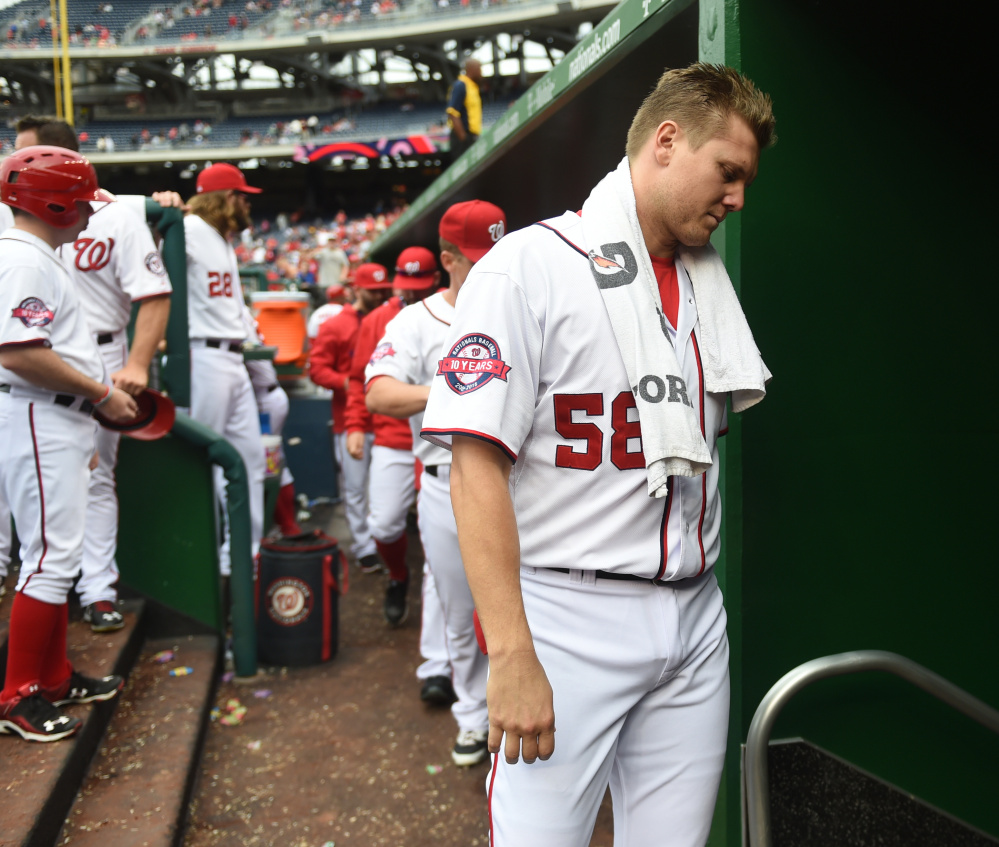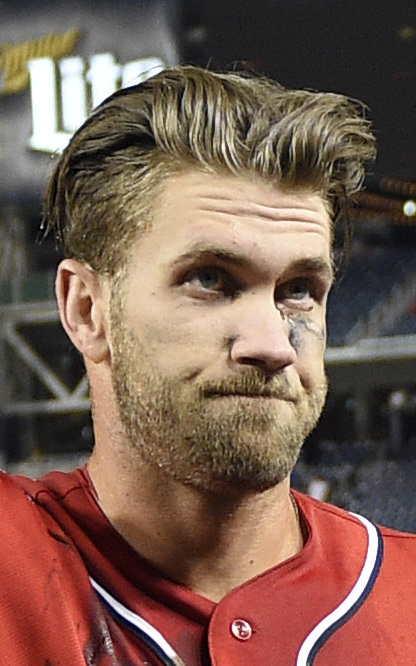Bryce Harper got choked Sunday afternoon for being Bryce Harper.
Jonathan Papelbon remains a relative outsider to the Washington Nationals but is a self-appointed flame bearer of baseball code. He attacked Harper because he subscribed to the outdated, lazy perception that Harper is a young punk who should know his place. Let us be clear about Harper’s place: He is the best baseball player in the world, the surefire Most Valuable Player of the National League and a 22-year-old who handled a sea of dysfunction with grace and professionalism. During a rotten season for a franchise in crisis, he was the very best thing about the Washington Nationals.
Papelbon will miss the remainder of the season without pay after the fight. He was suspended four games by the Nationals on Monday for the episode with Harper in addition to three games because he dropped his appeal of a Major League Baseball ban for throwing at an opponent’s head last week. Harper was held out of Monday’s game because of “his part in the altercation,” Nationals Manager Matt Williams said.
The notion that Harper is a malcontent or a cocky hothead or a threat to the game’s integrity is, to borrow a phrase, tired. He plays as hard as any teammate would expect – with the apparent exception of Papelbon, a guy who’s played about 1,200 fewer innings than him this season.
One insane thing about Sunday is that Harper did run out that pop-up. He muttered in frustration, tossed his bat, shook his head and trotted down the line. He reached the base. In Game 155 of a mathematically dead season, that constitutes running it out. That counts.
It counts, that is, unless you are looking for a reason to vilify Harper. In the aftermath of Sunday’s fracas, a small chorus of former players have risen to back Papelbon. They, like Papelbon, are castigating the obsolete idea of Bryce Harper rather than reckoning with the MVP who is the only reason the Nationals season cannot be considered a total waste.
Harper is still learning, and he’s far from perfect. But he’s also 22, and no player is perfect. Along with his historic offensive numbers, Harper has matured this season after the missteps of 2014. The Nationals rallied around Matt Williams – imagine that – last April when the manager benched Harper for loafing on a tapper back to the pitcher. Harper ruffled teammates when, on the day he came off the disabled list, he criticized a lineup that had Denard Span in center field rather than himself.
That version of Harper does not exist anymore. At his most polarizing this season, he arrived at spring training and asked, “Where’s my ring?” The statement rang clumsy then and embarrassing now. But Harper was expressing his admiration for new teammate Max Scherzer and confidence in his team, not extolling himself.
Retired pitcher C.J. Nitkowski, writing for FoxSports.com, laid out the old-school case against Harper and for Papelbon. In polling a dozen current and former players, he wrote, he found all of them agreed with Papelbon.
“As much as I hate to say it, Albert, Papi and Miggy have earned the right not to run out every ball,” one of them said. “Partly age, respect and risk of injury. Harper is 22, he hasn’t earned it.”
“Bryce is a great player,” another added. “He’s a true superstar. But he’s not above playing the game the right way. I’m glad someone finally told him that.”
Nitkowski presented a viewpoint worthy of consideration, and he is right to point out that the baseball clubhouse environment is unique. But this is a case where cultural relativism should be rejected. If baseball thinks Harper was wrong, then baseball is wrong.
Again, by any acceptable standard, Harper did run out that ball. And he did it at the end of a season that would not look out of place in the prime of Ted Williams’s Baseball-Reference page. If Harper isn’t playing the right way, more players should figure out how to play the wrong way.
Since Harper’s rookie season, he has had to fight his persona in both his own clubhouse and others.
He starred in commercials, both MLB-produced and for products he endorsed, that compared him to a superhero. Players, both teammates and opponents, could glance at one another and ask, “What’s he done?” It became a familiar refrain to belittle Harper for others celebrating his potential and ignoring paltry results. (That those results were historic for a player his age is another debate.)
There is now a new answer to that question. This season, Harper could become the third player since 2000 to lead the majors in batting average, on-base percentage and slugging. The other two are Barry Bonds and Miguel Cabrera.
The Nationals put more on his shoulders than any player, a burden he embraces. He accepts media requests. He’s every kid’s favorite player and he accommodates as many as he can, especially ones in dire situations.
And each month, as part of his Harper’s Heroes program, he hosts a group of kids with cancer at Nationals Park.
The Associated Press contributed to this report
Send questions/comments to the editors.




Success. Please wait for the page to reload. If the page does not reload within 5 seconds, please refresh the page.
Enter your email and password to access comments.
Hi, to comment on stories you must . This profile is in addition to your subscription and website login.
Already have a commenting profile? .
Invalid username/password.
Please check your email to confirm and complete your registration.
Only subscribers are eligible to post comments. Please subscribe or login first for digital access. Here’s why.
Use the form below to reset your password. When you've submitted your account email, we will send an email with a reset code.